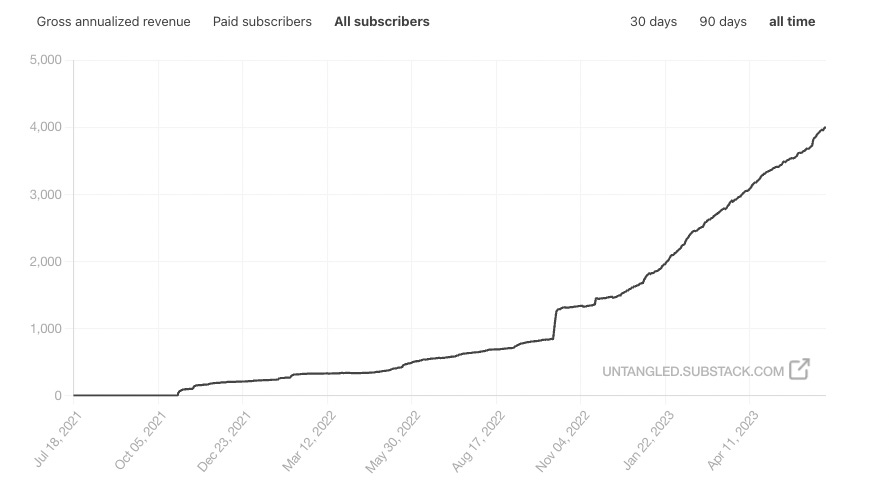🎉 Untangled reached 4K subscribers.
Let's celebrate with the largest discount yet, and opening up the archive!
Hi there, and welcome back to Untangled, a newsletter and podcast about technology, people, and power. One year ago, there were 560 of you. Earlier this week, Untangled crossed the 4,000 subscriber mark!
I love writing Untangled — the process brings me a lot of joy and helps me clarify what I think and believe. It’s not all rainbows and roses — writing is hard! A lot of ‘the process’ is me alone in my office, staring at the screen. This is why I intend to celebrate every mini-milestone — here are two li’l gifts, from me to you.
📣 I’m offering a 25% discount on annual subscriptions for the next 72 hours.
This is the largest discount I’ve offered to date. It’s also likely the largest discount I’ll ever offer. So, ‘act fast, and save now’ as they say in the business.
🚪I’m swinging open the door to the full archive for the next week.
It’s my sincere hope that each essay I write offers value and insight long after I click ‘send.’ The topics might themselves have a shorter shelf-life but the conceptual frameworks and social science research I distill have staying power. So bop around the archives, and try each framework on for size like a new pair of glasses - a lens to help you see the strange tech-mediated world around you just a li’l clearer. Go nuts!
To help you get started, I thought I’d highlight three of my all-time favorites, and share why I still return to them today:
In my very first issue of Untangled— Crypto is not decentralized — I argued that technical decentralization doesn’t do anything to decentralize power. I argued that decentralization actually hides power while signaling a kind of egalitarian, libertarian politics that emphasizes free choice, voluntary association, and a commitment to negative freedoms. Drawing on the work of
, I showed that, at the time, power in crypto was concentrated in intermediaries, voting and governance, token ownership, coordinated decision-making, computing power, and in informal authority. I concluded the piece by writing:What happens now depends on how power diffuses through crypto, the stories we tell about it, what we leave out, and whether its adherents are willing to confront the concentration of power.
I continue to return to the piece when I try to think about how power might be obscured within a socio-technical system. Or when I want to righteously congratulate myself for critiquing the claims of crypto back when it wasn’t cool.
In my second ever issue of Untangled — “Some unsatisfying solutions for Facebook” — I applied a conceptual framework for distinguishing between transparency and accountability initiatives to the ongoing problem that is Facebook: data access, algorithmic audits, and regulating reach, not speech. The essay offered a critique of transparency initiatives and asked that we start asking new questions. I closed by writing:
Instead of wondering how to 'fix' Facebook,' we should ask, 'how do we improve our information ecosystem?'. That question makes room for solutions like taxing targeted advertising, thus freeing up funds to support local news, and the development of alternative systems guided by new assumptions and values.
It's hard to come back from this, but somehow 'more technology' has become justified on its own terms, as a representation of progress. But technology, just like transparency, is only ever a means. It's up to us to define the ends.
This essay foregrounded a number of the themes I would write about for Untangled. I return to this essay whenever I want to think deeply about the relationship between transparency and accountability, the ways in which algorithms and people are entangled, or the problem of scale.
More recently, I wrote, “Will ChatGPT replace search?” It’s one of my most read issues, and I think that’s because it tried to answer a question that few in the news cared to ask, namely: what even constitutes a good search system? Most news coverage focused on the competitive dynamics — how Microsoft jumping in first might influence the market share of Bing vs. Google search, but I was trying to press pause on the conversation and ask ‘uh, if we use ChatGPT for search, what might the social consequences be?’ Drawing on a large body of research into how people actually use search, I showed how technologies like ChatGPT might actually limit the process of sense-making.
I return to this piece when I want to think deeply about how people — in our infinite messiness — interact with technology. The research for this essay also helped me conceive of “The Illusion of ChatGPT” and “AI isn’t ‘hallucinating.’ We are.” Maybe it will have the same compounding effect on your thinking too?
Anyway, that’s it for this mini-celebration. For paid subscribers, I’m adding an additional token of my appreciation.
Keep reading with a 7-day free trial
Subscribe to Untangled with Charley Johnson to keep reading this post and get 7 days of free access to the full post archives.




